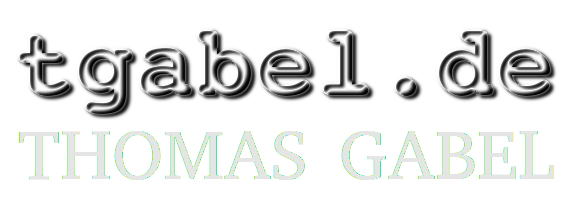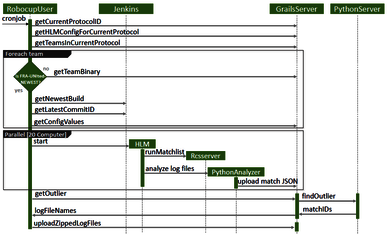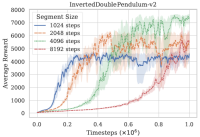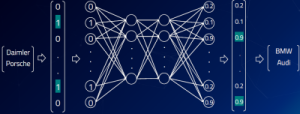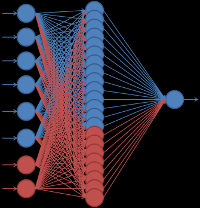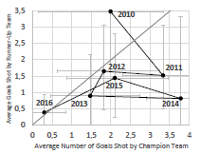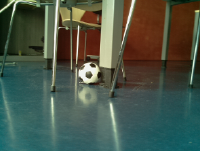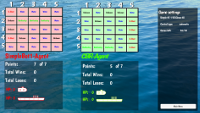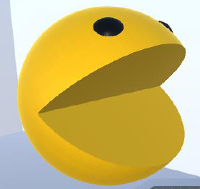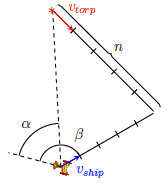List of Finished Thesis Projects
Download links for PDFs are only available when permitted by the author. They can also be sent to visitors via email on request.
- R. Parzeller, Frankfurt University of Applied Sciences and Siemens AG Munich: "Multi-Agent Reinforcement Learning for 3D-CAD Automated Electrical Routing", Winter Term 2022/23.
- L. Schütz, Frankfurt University of Applied Sciences: "Evaluation of Synthesis Methods for the Development of a Named Entity Recognition Model Based on Faults in a Transmission Network", Summer Term 2022.
- A. Vieth, Frankfurt University of Applied Sciences: "A Continuous Integration System with Diversified Opponents and Dynamic Team Configurations for RoboCup 2D", Summer Term 2022.
See Thesis Spotlight below - F. Sommer, Frankfurt University of Applied Sciences: "Deep Reinforcement Learning Meets Case-Based Reasoning: Entwicklung eines neuronalen Zweikampfverhaltens mit Methoden des optimierenden Lernens und fallbasierter Vorhersage gegnerischer Aktionen im simulierten Roboterfußball", Summer Term 2022.
- A. Bosnjak, Frankfurt University of Applied Sciences: "Maschinelles Lernen zur Prognose von Fußballergebnissen", Winter Term 2021/22.
- N. Jorek, Frankfurt University of Applied Sciences: "Machine Learning for Safer Smart Environments: Exploration and Evaluation of Reinforcement Learning for Time Series Anomaly Detection", Summer Term 2021.
See Thesis Spotlight below - A. Brening, Frankfurt University of Applied Sciences: "Stochastischer Gradientenabstieg zum Trainieren neuronaler Netze: Implementierung und vergleichende Untersuchung des RMSprop-Lernverfahrens für den n++-Simulator", Winter Term 2020/21.
- M. Wichtner, Frankfurt University of Applied Sciences: "Deep Reinforcement Learning: Overcoming the Challenges of Deep Learning in Discrete and Continuous Markov Decision Processes", Winter Term 2019/20.
See Thesis Spotlight below - P. Klöppner, Frankfurt University of Applied Sciences: "Untersuchungen zum Ende-zu-Ende-Lernen im simulierten Roboterfußball mit tiefem optimierendem Lernen", Summer Term 2019.
See Thesis Spotlight below - P. Haslbauer, Frankfurt University of Applied Sciences: "Reinforcement Learning in the Context of Financial Time Series Applications: Performance Analysis of Policy Optimization Algorithms for Autonomous Forex Trading Systems", Summer Term 2019.
- J. Hammerschmitt, Frankfurt University of Applied Sciences: "Evaluierung verschiedener Verfahren zur Identifikation des Verschleißes bei Synchronmotoren auf Basis maschinellen Lernens", Summer Term 2019.
- A. Vieth, Frankfurt University of Applied Sciences: "ReLU in n++ - Implementation und Vergleich", Summer Term 2019.
- V. Ho, Frankfurt University of Applied Sciences: "Investigation and Application of a Neural Network-Based Approach to a Recommender System for the Alexa Skill Favorite List at Börse Frankfurt", Summer Term 2019.
See Thesis Spotlight below - R. Berneburg, Frankfurt University of Applied Sciences: "Irreführung neuronaler Bilderkennung: Evolutionäre Optimierung von Bildfiltern zur Verminderung der Leistungsfähigkeit tiefer Bilderkennungsnetze", Winter Term 2018/19.
- J. Bickel, Frankfurt University of Applied Sciences: "Imitationslernen im Spiel Star Ships: Entwicklung eines Ansatzes zur Nachahmung menschlichen Spielerverhaltens mittels fallbasierten Schließens", Winter Term 2018/19.
- S. Lülow, Frankfurt University of Applied Sciences: "Implementierung eines Modells zur Verhaltensvorhersage von Gegenspielern im simulierten Roboterfußball mittels Fallbasierten Schließens", Winter Term 2018/19.
- A. Mathias, Frankfurt University of Applied Sciences: "Anwendung und Untersuchung evolutionärer Algorithmen zur optimierten Erstellung von Trainingszeitplänen", Summer Term 2018.
- L. Müller, Frankfurt University of Applied Sciences: "Evaluierung von Apache NiFi als System für die automatisierte Verteilung und Verarbeitung großer Datenmengen", Winter Term 2017/18.
- T. Rohrer, Frankfurt University of Applied Sciences: "Gestenerkennung im Augmented-Reality-Umfeld
mittels neuronaler Netze", Winter Term 2017/18.
See Thesis Spotlight below - A. Johannes, Frankfurt University of Applied Sciences: "Künstliche Intelligenz in Videospielen: Anwendung stochastischer Baumsuchalgorithmen für das Spiel 'Dots and Boxes'", Winter Term 2017/18.
- J. Grünwald, Frankfurt University of Applied Sciences: "Optimierung eines Manufacturing-Execution-Systems zur intuitiveren und fehlerfreieren Eingabe von Stammdaten", Winter Term 2017/18, in collaboration with Continental Automotive GmbH.
- M. Noll, Frankfurt University of Applied Sciences: "Entwicklung eines Simulationsprogramms zur Stauentstehung auf Grundlage des Nagel-Schreckenberg-Modells", Summer Term 2017
See Thesis Spotlight below - T. Raschke, Frankfurt University of Applied Sciences: "Wettbewerbsfähigkeit autonom erlernter Verhaltensweisen im simulierten Roboterfußball: Optimierung eines Dribbelverhaltens zur Einsatzbereitschaft bei RoboCup-Turnieren", Winter Term 2016/17
See Thesis Spotlight below. - S. Breuer, Frankfurt University of Applied Sciences: "Simulation der Simulation: Statistische Analyse der Ergebnisse der RoboCup-Simulationsliga 2016", Winter Term 2016/17
See Thesis Spotlight below. - S. Gemici: "Konzeption und Entwicklung eines intelligenten Agenten unter Verwendung von fallbasiertem Schließen und evolutionären Algorithmen im Kontext des IJCAI-Angry-Birds-Competition Frameworks", Master Thesis, Winter Term 2016/17
- F. Sommer, Frankfurt University of Applied Sciences: "Maschinelles Lernen im simulierten Roboterfußball: Entwicklung eines neuronalen Dribbelverhaltens mit Methoden des Reinforcement Learnings", Winter Term 2016/17
- F. Seipel, Frankfurt University of Applied Sciences: "Entwicklung einer Frontend-Volltextsuche für Typo3-Websites auf Basis der Suchmaschine Elasticsearch", Winter Term 2016/17
- E. Kartal, Frankfurt University of Applied Sciences: "Entwurf und Implementierung einer Java-Anwendung zur Steuerung von Cisco-IP-Telefonen am Cisco Unified Communications Manager", Summer Term 2016
- B. Rauch, Frankfurt University of Applied Sciences: "Entwicklung einer Android-Mehrspieler-Anwendung: Empirische Erfassung von Spielbarkeit in Bezug auf Netzwerklatenz und Reaktionszeit", Summer Term 2016
- A. Fuhrmann, Frankfurt University of Applied Sciences: "Deep Learning in der Bilderkennung: Steuerung autonomer mobiler Roboter mit Hilfe neuronaler Netze", Summer Term 2016
See Thesis Spotlight below - E. Zengin, Frankfurt University of Applied Sciences: "Künstliche Intelligenz in Computerspielen: Untersuchung von Methoden des fallbasierten Schließens zur Strategieoptimierung im Spiel 'Schiffe versenken'", Summer Term 2016
See Thesis Spotlight below - C. Schneider, Frankfurt University of Applied Sciences: "Design and Implementation of a Java Application for Visualizing the Effect of Linear Mappings of Matrices", Winter Term 2015/16
- S. Becker, Frankfurt University of Applied Sciences: "Automatische Sicherstellung der Funktionalität eines Open Source APM Werkzeugs auf unterschiedlichen Technologiestacks", Winter Term 2015/16
- M. Hachmuth, Frankfurt University of Applied Sciences: "Untersuchung adaptiver Software-Agenten in Virtual-Reality-Umgebungen", Bachelor Thesis, Summer Term 2015
See Thesis Spotlight below. - B. Dankert, Frankfurt University of Applied Sciences: "Evaluation kompetetiver Multi-Agenten-Systeme: Statistische Auswertung von Leistungsfähigkeit und Fortschritten in der 2D-Simulationsliga des RoboCup", Bachelor Thesis, Summer Term 2015
- B. Nötscher, Frankfurt University of Applied Sciences: "Untersuchung baumbasierter Suchverfahren für intelligente Agenten und deren Anwendung für rundenbasierte Strategiespiele", Bachelor Thesis, Summer Term 2015
See Thesis Spotlight below. - C. Lutz, University of Freiburg: „Autonom lernende Agenten in Computerspielen: Anwendung von Reinforcement-Lernverfahren im Star Ships Learning Framework”, Bachelor Thesis, Summer Term 2010
See Thesis Spotlight below. - D. Stier, University of Freiburg: „Einsatz von Reinforcement Learning zur
Geschwindigkeitsregulierung in mikroskopischer Verkehrssimulation”, Bachelorarbeit, Summer Term 2010 - D. Hoehle, Vrije Universiteit Amsterdam: „A General Agent Model of Emotion and Trust Using the BDI Structure”, Master Thesis (technical supervision), Winter Term 2009/10
- E. Wolowik, University of Osnabrück: „Hybride Ansätze zum Optimieren kooperativer Angriffsstrategien”, Diploma Thesis, Summer Term 2008
- S. Müller, University of Osnabrück: „Automatic Acquisition of Human-Readable Go Knowledge”, Bachelor Thesis, Summer Term 2008
- T. Schwegmann, Universität Osnabrück: „Flashanimationen von RoboCup Soccer 2D-Simulationen”, Diploma Thesis, Summer Term 2007
- H. Schulz, Universität Osnabrück: „Unsupervised Extraction of Visual Features for Neural Net-Based Reinforcement Learning”, Bachelor Thesis (technical supervision), Winter Term 2006/07
- J. Knabe, Universität Osnabrück: „Kooperatives Reinforcement Lernen in
Multiagentensystemen”, Bachelor Thesis (technical supervision), Summer Term 2005 - H. Strasdat, Universität Osnabrück: „Training neuronaler Netze mit stochastischen Daten”, Bachelor Thesis (technical supervision), Summer Term 2005
Thesis Spotlights
A. Vieth:
A Continuous Integration System with Diversified Opponents and Dynamic Team Configurations for RoboCup 2D
Supervisors: T. Gabel and E. Godehardt
The robotic soccer team of the Frankfurt University of Applied Sciences (FRA-UNIted) is utilizing a Continuous Integration Environment (CI) to automatically run 1000 games of simulated soccer against a selected team every night. This process allows for a continuous assessment of FRA-UNIted's performance against a top-level
competitor, but bears the risk of overfitting against that specific opponent, since even if the performance against the training team improves, some behavioral faults which might exist against other teams will remain undetected, thus degrading overall team performance. In this thesis, the existing CI system is reworked to minimize the risk of overfitting and to allow for a more robust analysis of FRA-UNIted's general performance by allowing for a diversification of opponents and defining arbitrary team configuration values. The system is then used to compare the previously assumed performance against a new broader performance, as well as analyzing the consequences of changing certain team configuration values.
Download: pdf
N. Jorek:
Machine Learning for Safer Smart Environments: Exploration and Evaluation of Reinforcement Learning for Time Series Anomaly Detection
Supervisors: T. Gabel and D. Fährmann
Anomaly detection in smart environments is an attractive research area for the application of machine learning methods. Recent research on anomaly detection methods has in part considered the use of reinforcement learning. The combination of reinforcement learning and deep learning techniques has already been used with promising results in other domains. In the context of this thesis, the application of a deep reinforcement learning approach in the domain of anomaly detection for smart environments is investigated. The thesis' contribution is the implementation and evaluation of a dynamic and reusable anomaly detection framework, which employs several adaptations of the well-known algorithm deep Q-learning algorithm. The implementation and analysis of double deep Q-learning with prioritized experience replay is a novel contribution to anomaly detection in smart environments.
Download: pdf
M. Wichtner:
Deep Reinforcement Learning: Overcoming the Challenges of Deep Learning in Discrete and Continuous Markov Decision Processes
Supervisors: T. Gabel and C. Baun
In the last couple of years, the reinforcement learning (RL) research community successfully picked up the utilization of deep neural networks. While the application of non-linear function approximation in RL has been known for quite a while, the relevant methods remained relatively obscure and were unstable for a variety of domains. Recent research tries to understand the black box of deep neural networks in the context of RL. Hence, a variety of improvements were aimed at guaranteeing a stable and reliable learning process in high-dimensional RL environments. These improvements enabled the extension of RL from trivial problems to much more complicated and exciting ones. Unfortunately, many of these algorithms have become incredibly complicated. Many of the novel methods require meticulous hyper-parameter tuning, which makes their (further) development notoriously hard. As a consequence, it is essential to provide reproducibility and to preserve a vital degree of transparency, while striving for algorithm simplicity at the same time. To that end, this thesis reviews the challenges of deep RL theoretically and analyzes reproducibility and important algorithmic details empirically. It explores the difficulties of combining RL with deep learning and discusses the latest satisfactory solutions. Most importantly, it sheds light on seemingly unimportant hyper-parameters and algorithmic features.
Download: pdf
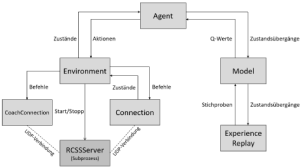
P. Klöppner:
Untersuchungen zum Ende-zu-Ende-Lernen im simulierten Roboterfußball mit tiefem optimierendem Lernen
(Towards End-to-End Leaning in Robotic Soccer Simulation Using Deep Reinforcement Learning),
Supervisors: T. Gabel and U. Bauer-Wersing
Robotic Soccer Simulation is an excellent testbed for evaluating reinforcement learning approaches. In this work, several steps are taken for realizing a full end-to-end learning approach in the context of 2D soccer simulation. Agents are made to learn based on raw sensor inputs for several soccer-related skills using a newly developed Python-based learning framework that resides on top of the soccer simulation (Soccer Server) environment and that can be made to interact with powerful machine learning libraries, such as TensorFlow.
Download: pdf
V. Ho:
Investigation and Application of a Neural Network-Based Approach to a Recommender System for the Alexa Skill Favorite List at Börse Frankfurt,
Supervisors: T. Gabel and C. Baun
The Alexa Skills Service as provided by Amazon enables developers to develop and publish their own voice services. The Börse Frankfurt also provides an Alexa Skills Service on Amazon Echo devices (e.g. on Echo Dot, Echo Show, etc.). This service is targeted at investors who can query current share prices at the Börse Frankfurt by using voice commands. In addition, investors are allowed to create their own watch list, so that they can get an overview of their favorite stocks via a single voice command. This thesis focused on the development of a recommender system that is capable of proposing additional stocks that might be of interest to a particular investor using a neural network-based approach.
T. Rohrer:
Gestenerkennung im Augmented-Reality-Umfeld mittels neuronaler Netze
(Gesture Detection for Augmented Reality Systems Using Deep Neural Networks), Supervisors: T. Gabel and C. Baun
This thesis analyses convolutional neural networks for recognizing hand gestures
which were performed on the Microsoft HoloLens. A two dimensional convolutional network and a three dimensional extension were drafted, implemented and evaluated. Since no gesture data set was available, 600 real gesture data from four different classes where created in real interaction with the Microsoft HoloLens.
Visualizations of the parameters, which were learned by the network
could show gesture properties which were detected by the network.
Download: pdf on request
M. Noll:
Entwicklung eines Simulationsprogramms zur Stauentstehung auf Grundlage des Nagel-Schreckenberg-Modells
(Development of a Simulation Tool for Traffic Jam Analysis Based on the Nagel-Schreckenberg Model), Supervisors: T. Gabel and C. Baun
This bachelor thesis focuses on traffic flow modelling and traffic jams. The author develops a easy-to-use Java-based simulation program that models traffic using an extension of the well-known Nagel-Schreckenberg model and performs in-depth analysis for various traffic scenarios.
Download: pdf
T. Raschke:
Wettbewerbsfähigkeit autonom erlernter Verhaltensweisen im simulierten Roboterfußball: Optimierung eines Dribbelverhaltens zur Einsatzbereitschaft bei RoboCup-Turnieren
(Competetiveness of Autonomously Learnt Behaviors in Soccer Simulation: Optimization of a Dribble Behavior to be Used at RoboCup Competitions), Supervisors: T. Gabel and C. Baun
This bachelor thesis project deals with the challenge of using reinforcement learning (RL) in the application domain of robotic soccer simulation. The author focuses on the dribble sub-problem of simulated soccer, models the environment as a Markov decision process, and applies state-of-the-art RL algorithms in conjunction with value function approximation with neural networks to come up with a learnt dribble behavior that clearly outperforms all hand-coded dribble routines that were applied previously in the context of our robotic soccer simulation team FRA-UNIted.
Download: pdf
S. Breuer:
Simulation der Simulation: Statistische Analyse der Ergebnisse der Robocup-Simulationsliga 2016
(Simulating the Simulation: Statistical Analysis of the Results of the 2D Simulation League at RoboCup 2016), Supervisors: T. Gabel and C. Baun
This bachelor thesis project has focused on the results that came out of 2016's competitions in the soccer simulation 2D league at the RoboCup World Championships tournament in Leipzig (Germany). By performing an extensive empirical study involving 85.000 matches of simulated soccer (which corresponds to more than one and a half year of wall-clock time), the author unveils that RoboCup 2016 has witnessed a situation where the two finalist teams were as close to each other as never before. Moreover, the author determines the ground truth of playing performance of all participating teams and concludes that the 2016 competition results strongly deviate from that ground truth. Essential results of this thesis are summarized in a paper linked below.
Download: paper pdf
A. Fuhrmann:
Deep Learning in der Bilderkennung: Steuerung autonomer mobiler Roboter mit Hilfe neuronaler Netze
(Deep Learning for Image Recognition: Controlling Autonomous Mobile Robots Using Neural Networks), Supervisors: T. Gabel and C. Baun
This bachelor thesis project deals with the challenge of using machine learning for orientation and navigation by visual perception, based on a practical example
using a self-constructed robot vehicle. The author focuses on deep neural networks for image recognition and performs a the theoretical and practical comparison of training models for these networks. The usability of the methods used is evaluated in the context of robot navigation in dynamic environments, using a fully autonomous mobile robot vehicle based on a Raspberry Pi, which has also been designed and constructed during this bachelor project.
Download: pdf
E. Zengin:
Künstliche Intelligenz in Computerspielen: Untersuchung von Methoden des fallbasierten Schließens zur Strategieoptimierung im Spiel "Schiffe versenken"
(Artificial Intelligence in Computer Games: Analysis of Case-Based Methods for Policy Optimization in the Game "Battleship 2D"), Supevisors: T. Gabel and C. Baun
In this thesis project a special version of the classic battle ships game was implemented in which the AI-based opponent player optimizes its playing behavior using a case-based reasoning (CBR) approach. The CBR agent successively observes its human counterpart, analyses the human's way of playing, and realizes a case-based opponent modelling approach which allows for quickly improving its playing strength.
Download: pdf
M. Hachmuth:
Untersuchungadaptiver Software-Agenten in Virtual-Reality-Umgebungen
(Analysis of Adaptive Software Agents in Virtual Reality Environments), Supevisors: T. Gabel and C. Baun
In this thesis project a new mobile game called "Virtual Reality PacMan 3D" has been developed which brings the classic PacMan game into the world of VR. The resulting game has been developed for use with the VR head-set Dive by Durovis and has been optimized with respect to their SDK. Furthermore, the behavior of the ghost agents in this game has been optimized using machine learning approaches such that human players face a challenging environment. The fully functional game (best used in combination with a Dive VR head-set) can be downloaded as an Android package (apk).
Download: apk
B. Nötscher:
Untersuchung baumbasierter Suchverfahren für intelligente Agenten und deren Anwendung für rundenbasierte Strategiespiele
(Analysis of Tree-Based Search Methods for Intelligent Agents and Their Application to Turn-Based Strategy Games), Supevisors: T. Gabel and C. Baun
In this thesis project a new strategy game called "The American Civil War" has been developed which leans some ideas from the well-known board game "Risiko" as well as from the card game "Battle for Stalingrad". The rule set of the game is quite complex yielding a state space size much larger than in well-known games like Go. Accordingly, the application of tree-based search procedures like Monte-Carlo tree search in this domain is both, promising and challenging. The author demonstrates that an adapted version of UCT can be employed successfully to obtain an agent that masters "The American Civil War".
Download: PDF
C. Lutz:
Autonom lernende Agenten in Computerspielen: Anwendung von Reinforcement-Lernverfahren im Star Ships Learning Framework
(Autonomous Learning Agents in Computer Games: Application of Reinforcement Learning Within the Star Ships Learning Framework), Supevisors: T. Gabel and M. Riedmiller
In this thesis project, a new variant of a batch-mode reinforcement learning algorithm has been applied within the Star Ships Learning Framework. In this arcade game framework two agent-based star ships fight one another. The author demonstrated that, using batch-RL, fighting behaviors for attack as well as torpedo evasion can be learned fully autonomously, yielding an agent with superior playing capabilities.
Download: PDF
Further Information: Research Using SSLF
